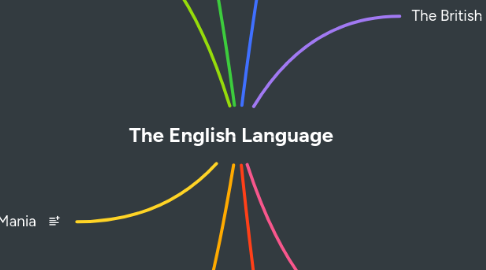
1. Language
1.1. It is a symbolic system of communication through which people communicate and through which culture is transmitted.
1.1.1. Native or first language it is the language first acquired by a child (mother tongue) or preferred in a multilingual situation despite the official language of the place where you were born.
2. English as a global language
2.1. Nowadays there are more people who speak English as an additional language than there re native speakers of English.
2.2. Lingua franca: is an auxiliary language adopted as a common language between speakers whose native languages are different, used for communication between them. It facilitates trade, diplomacy, and cultural exchange. Historically, English has served as a lingua franca in a lot of opportunities.
3. English Mania
3.1. Patricia Ryanconsiders that although we need a global language, because that works as a bridge between people, it is important to be careful and not to use it as a barrier.
3.2. Jay Walker holds that English gives you a better life or work; he thinks that English globalization allows people to solve their problems,
4. English for me
4.1. However in my life English occupy the place of foreing language I deeply wish to use it as a second language in a future.
4.1.1. Second language: is a language which isn't your first language, but you need it daily for a specific context. In other words, it is the language that non-natives learn because they need to use it in their host nation to communicate in that particular society.
4.1.2. Foreign language: is the language that you decide to learn about and which you only use in specific situations, for example English for us as future teachers.
5. Culture
5.1. It has to do with the experience of living in a community and what it involves while society is the group of people necessary for culture to exist. That is to say that both of them are essential for human beings, they can't stand on their own.
5.2. Ethnocentrism: this concept involves a belief or attitude that one’s own culture is better than all others. It is to say that it involves judging or understanding cultural beliefs from the perspective of your own.
5.2.1. "The other"/ "Oterness" refers to the state or quality of being different, alien, or separated from the norm or the perceived self. It is a multidisciplinary concept, but in current academic discourse, it is associated with concepts such as colonizers and colonized; colonizers define the colonized ones as ‘otherness’.
5.3. Xenocentrism: it is the opposite of ethnocentrism and refers to the belief that another culture is superior to one’s own.
6. The British Empire
6.1. English language was born out of foreign invasions
6.1.1. Language borrowing: It is when a language incorporates features and words of another language. The word that is borrowed is called a borrowing word.
6.2. During the seventeenth and eighteenth centuries, British navigators expand their language
6.2.1. Cultural imperialism: Is the deliberate imposition of one's own cultural values on another culture.
